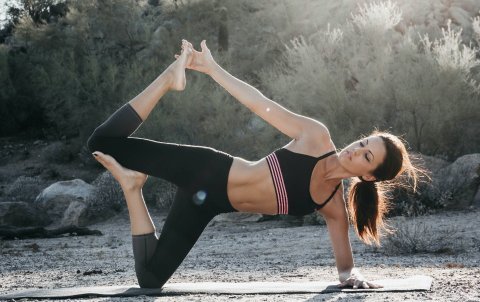
Deciding whether to work out in the morning or at night puzzles many. Science shows time can impact your fitness results. Our post will guide you through making that choice based on health and science.
Keep reading to find out more.
The body’s biological clock regulates many functions. It influences your sleep, energy, and alertness throughout the day.
Circadian rhythm affects how our bodies function throughout the day. This internal clock influences sleep, hormone levels, and energy patterns. Typically, this cycle runs on a 24-hour schedule.
It helps determine when we feel awake or tired.
Exercising at specific times can align with our circadian rhythms. Morning workouts often boost metabolism and energy for the day ahead. Evening sessions may tap into peak strength and endurance as our body temperature rises.
Understanding your biological clock can enhance workout effectiveness.
Your body’s internal clock dictates more than you might think.

Sleep cycles play a crucial role in our overall wellbeing. Each night, we go through several cycles of sleep, lasting about 90 minutes each. During these cycles, the body moves between light and deep sleep stages.
Our brains recharge during deep sleep while also helping with memory and learning.
Quality sleep supports exercise performance. Poor or interrupted sleep can lead to lower energy levels throughout the day. Establishing a consistent bedtime helps regulate these cycles.
A well-rested body performs better whether you choose morning or evening workouts. Prioritising good sleep habits enhances your ability to maximise your workouts effectively.
Morning workouts kickstart your metabolism for the day. They also boost your energy levels, making you feel more alert and ready to tackle tasks.
Morning workouts boost your metabolism. Exercising early in the day revs up calorie burning. Research shows that people who work out in the morning often enjoy a faster metabolic rate.
This heightened activity can keep burning calories long after you’ve finished exercising.
Engaging in physical activity in the morning sets a positive tone for the rest of your day. It helps you feel energised and ready to tackle tasks ahead. With this energy comes an ability to maintain healthy habits throughout the day, making it easier to stick with your fitness goals.
Now let’s explore how evening workouts can also offer unique benefits like enhanced performance.
Morning workouts can boost your energy levels for the day ahead. Engaging in exercise early helps activate your body and mind. Increased blood flow energises muscles and sharpens focus.
Research shows that people who work out in the morning report feeling more alert throughout the day.
Exercising after a long day’s work may help you unwind, but it might not offer the same initial boost as morning sessions. Evening workouts often lead to improved performance due to heightened body temperature, which enhances muscle function.
Understanding these differences is key to finding what works best for you when considering benefits like enhanced performance or greater weight loss.
Establishing a routine can greatly enhance your workout experience. People often find that working out at the same time each day helps them stay consistent. Morning workouts set a positive tone for the rest of the day.
They help you wake up, feel invigorated and prepare mentally for what lies ahead.
Evening workouts offer their own advantages. Many enjoy unwinding after a long day by hitting the gym or going for a run. This time allows individuals to release stress and refocus before bedtime.
No matter which option you choose, creating a routine makes it easier to stick with your fitness goals over time. Understanding your body’s clock will assist in choosing what works best for you.
Evening workouts can lead to enhanced performance. Many find they push themselves harder after a long day, resulting in greater weight loss.
Evening workouts often lead to enhanced performance. Studies show that people tend to perform better later in the day. Muscles warm up more easily, and strength levels peak in the evening.
This time also allows for higher endurance during longer sessions.
The body is fully awake at night. It adapts well to exercise demands when energy levels are high. Many athletes report improved reaction times and focus during evening training. These factors contribute significantly to overall workout efficacy.
Enhanced performance during evening workouts often leads to greater weight loss. Research shows that people who exercise at night burn more calories than those who work out in the morning.
Evening sessions allow for higher intensity, which results in better fat breakdown.
At night, your body is primed for movement. Muscles are warmed up and energy levels peak after a day’s worth of fuel intake. This boosts metabolism and helps with calorie burn post-workout.
Nighttime workouts can also lead to improved long-term fitness habits as you may stick with this routine longer, driving sustained weight loss over time.
Evening workouts can help prioritise sleep. Many people struggle with falling asleep after an intense workout. Exercising late may raise heart rates and body temperatures. This stimulation can make it tough to wind down.
Research shows that a decent night’s sleep boosts recovery and performance. Rested individuals tend to have sharper focus and better endurance. Sleep plays a key role in muscle repair too, which is vital for fitness gains.
Choosing evening sessions might work best for those who value their rest as much as their workout routine does.
Finding the right time to exercise remains crucial for your lifestyle choices. Understanding these benefits helps determine if you prefer morning or evening workouts.
Deciding the best time for working out depends on your personal body clock and goals. Dr. Emily Thompson, a leading expert in sports science with over 15 years of experience, sheds light on this topic.
Holding a PhD in Exercise Physiology from the University of Cambridge, her research focuses on how exercise timing affects performance and health.
Dr. Thompson states that morning workouts can boost metabolism and help establish a consistent routine. Yet, evening exercises may lead to better performance and weight loss outcomes.
She emphasises that safety, ethical training practices, and transparency about physical limits are crucial regardless of workout timing.
For integrating exercise into daily life, she suggests listening to your body’s natural rhythm. Trying different times can help identify what feels right for you.
In comparing morning versus night workouts, Dr. Thompson notes both have benefits depending on individual goals and lifestyles. Morning sessions might be better for those seeking routine or metabolic advantages; evening workouts could suit those aiming for peak performance or stress relief after work.
Her final verdict recognises no one-size-fits-all answer exists for workout timing effectiveness. The key is experimenting with both options to discover what aligns best with your lifestyle and fitness objectives.
According to scientific research, the best time for a workout depends on individual preferences and schedules as both morning and evening exercises have their benefits.
Morning workouts can boost your energy levels for the day ahead, improve your mood, and promote better sleep at night.
Yes, nighttime workouts can help relieve stress after a long day and may also assist with muscle growth since certain hormones peak in production during this period.
Your decision should be based on what feels best for you personally, considering factors like your daily schedule, energy levels throughout the day and fitness goals.
Feel free to send us any questions you may have. We are happy to answer them.
Whether you’re training at home, teaching others, or exploring new workouts, we’re here to guide your journey.
Feel free to send us any questions you may have. We are happy to answer them.